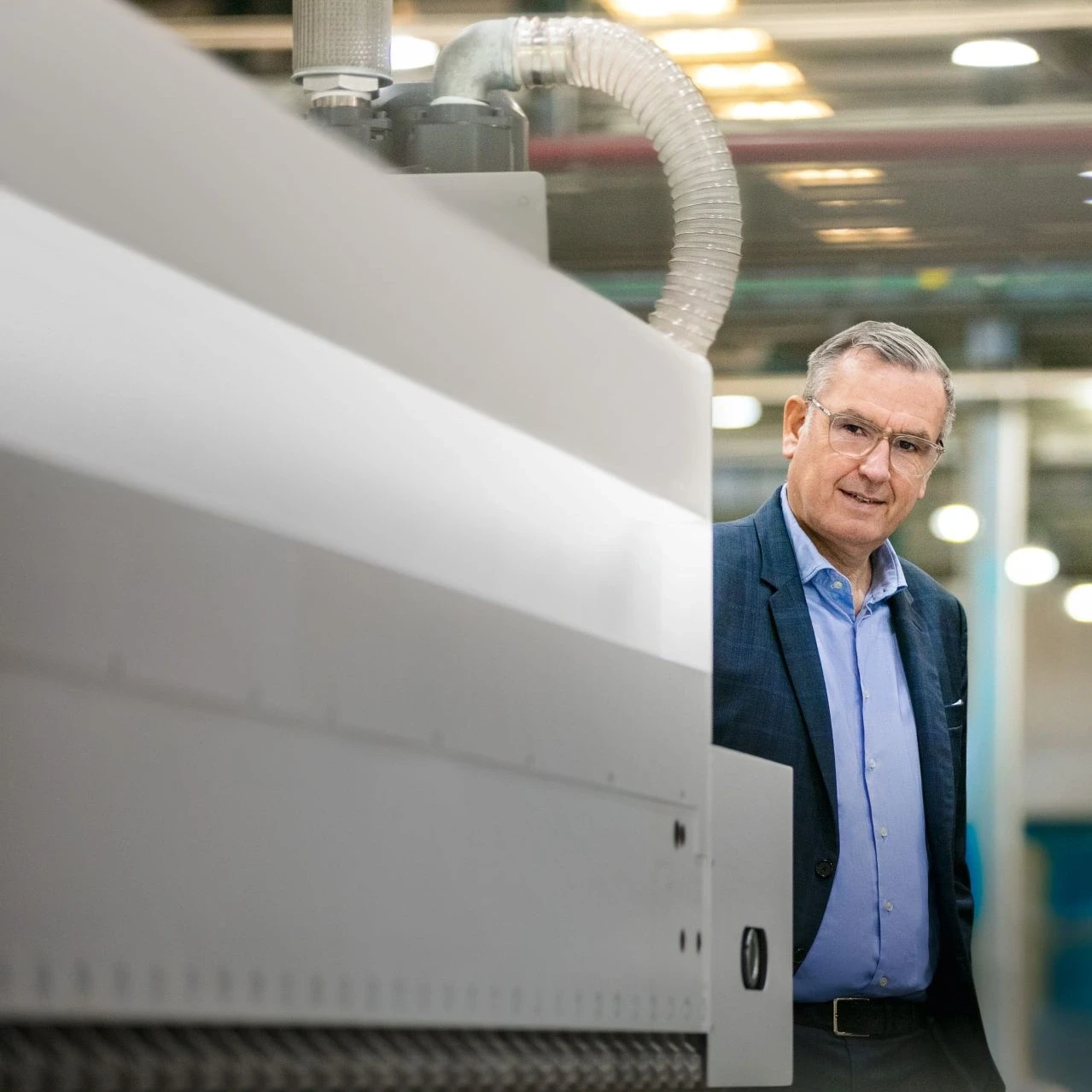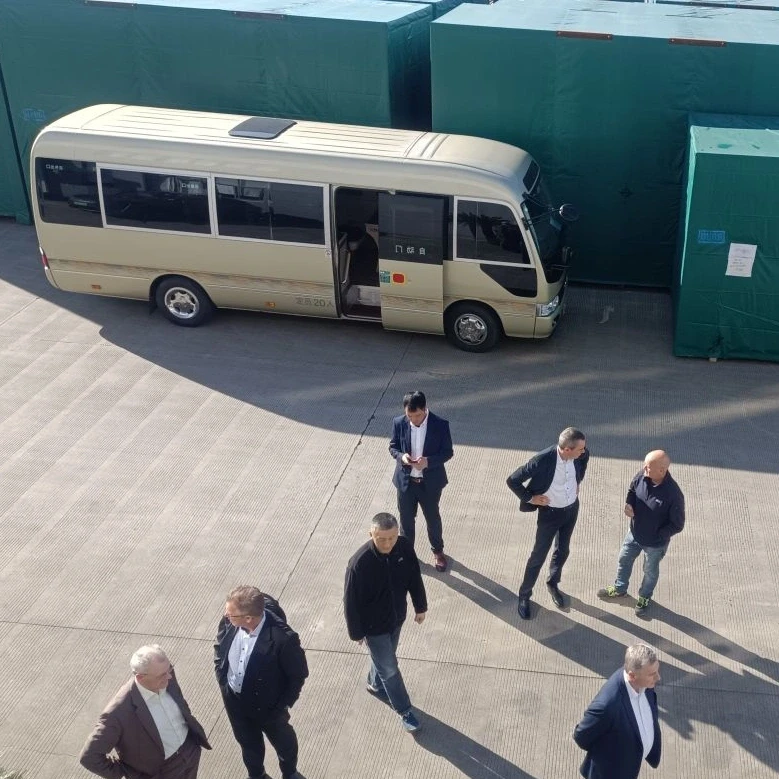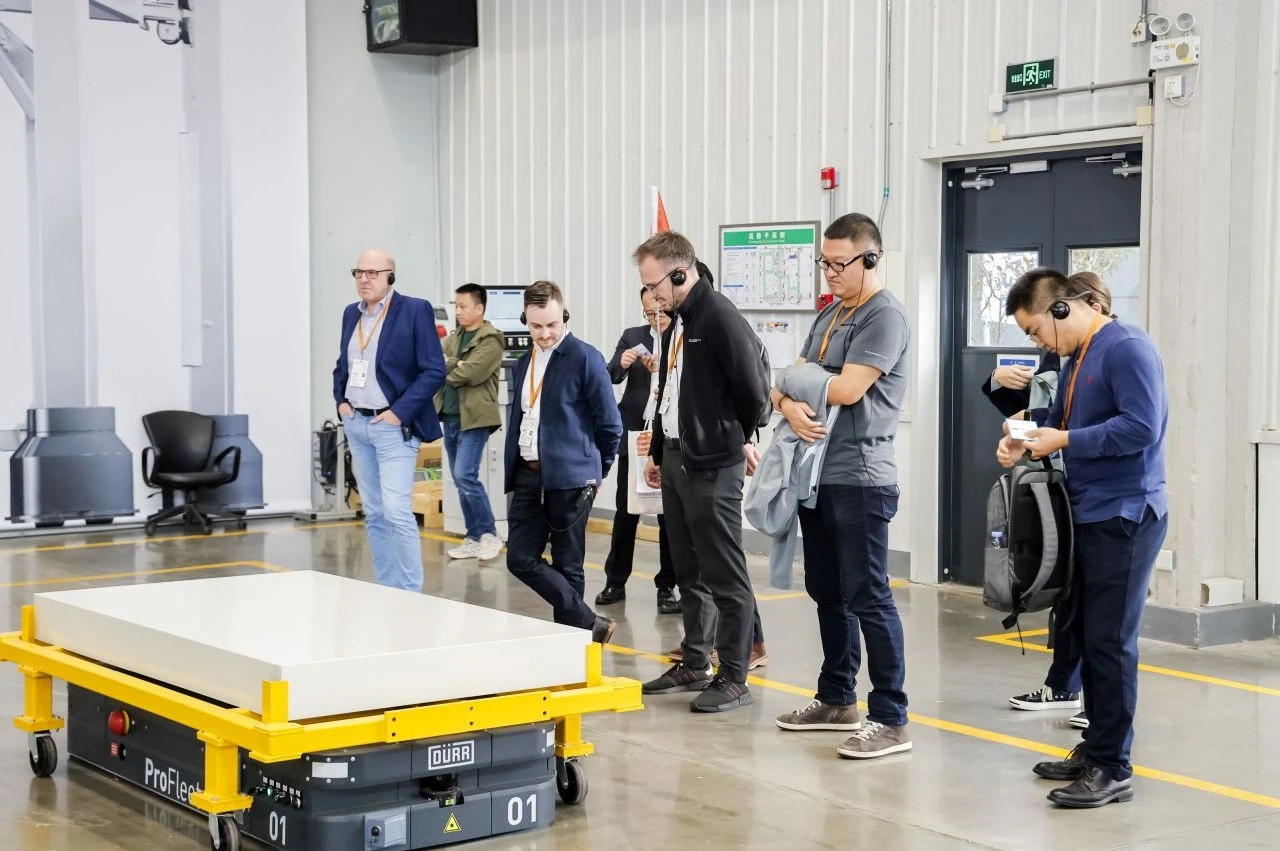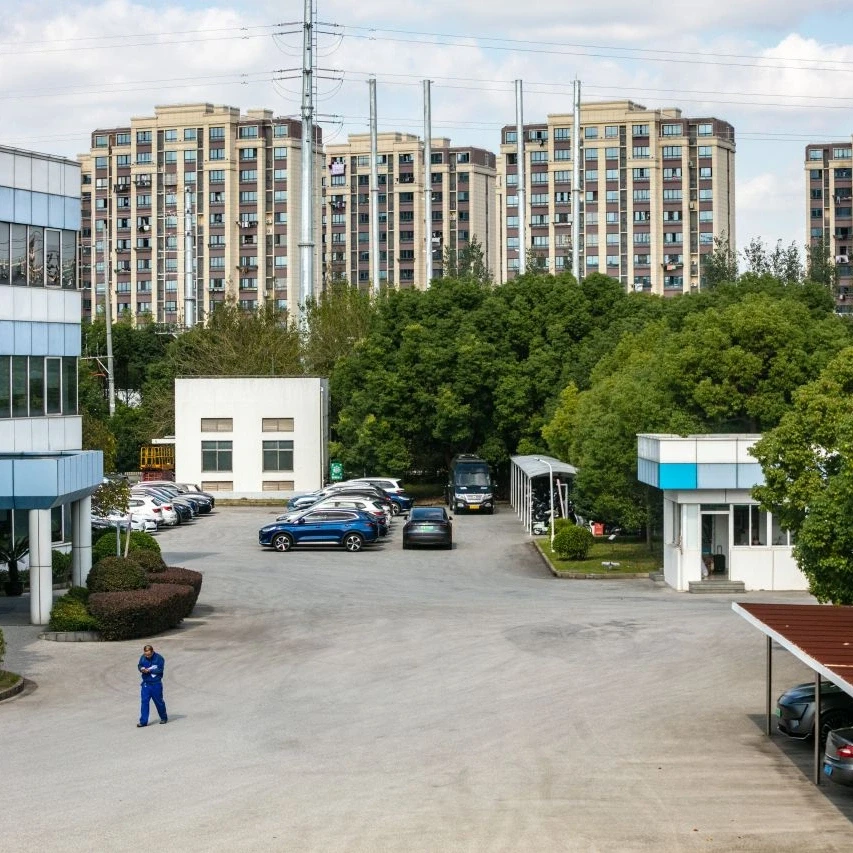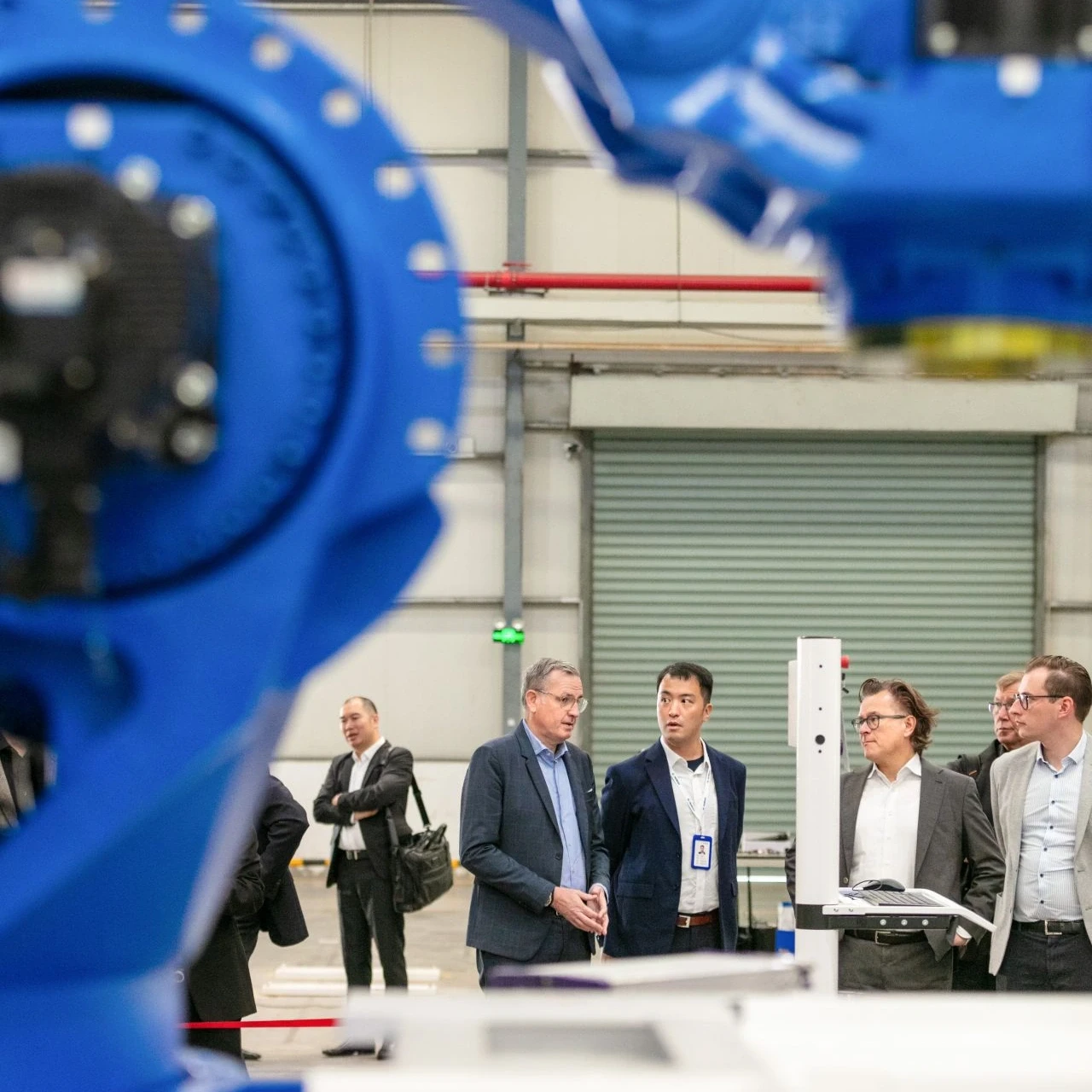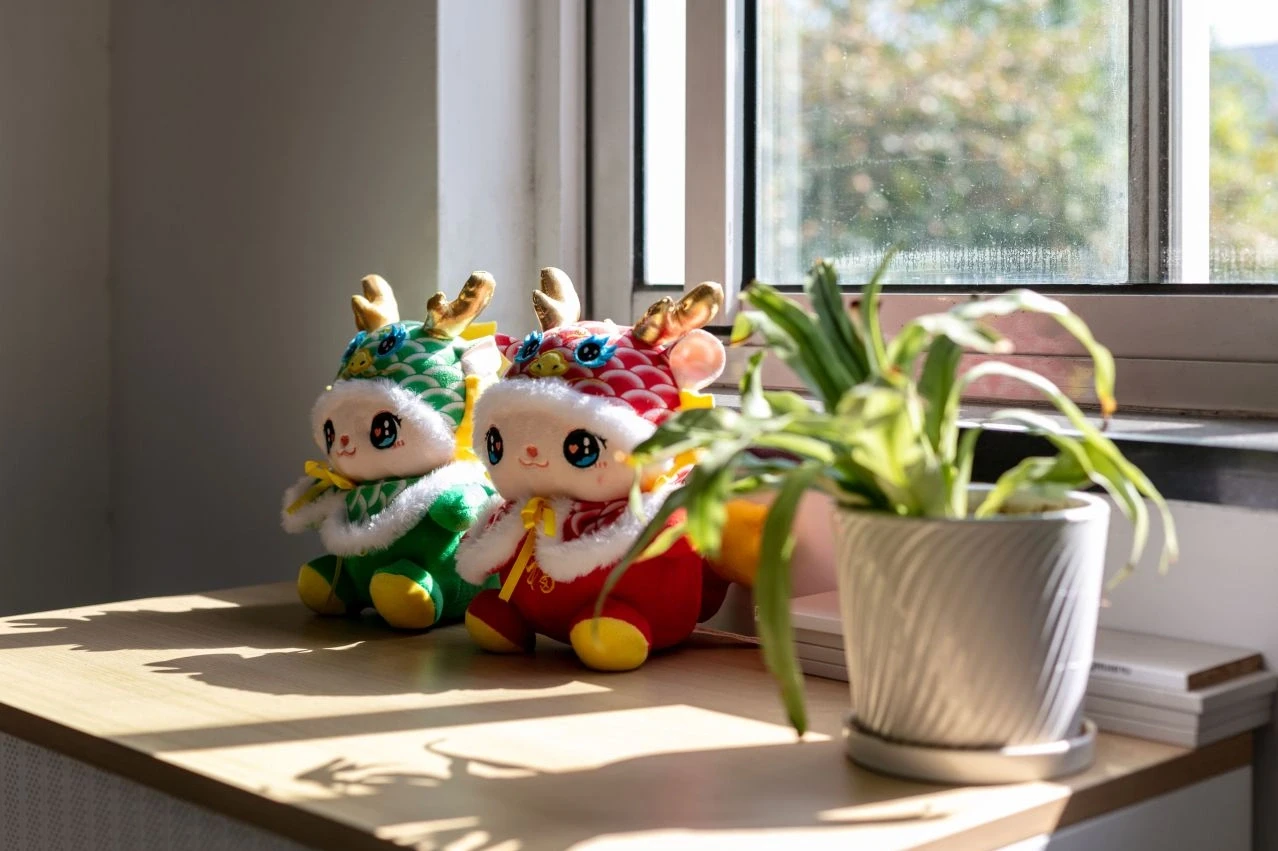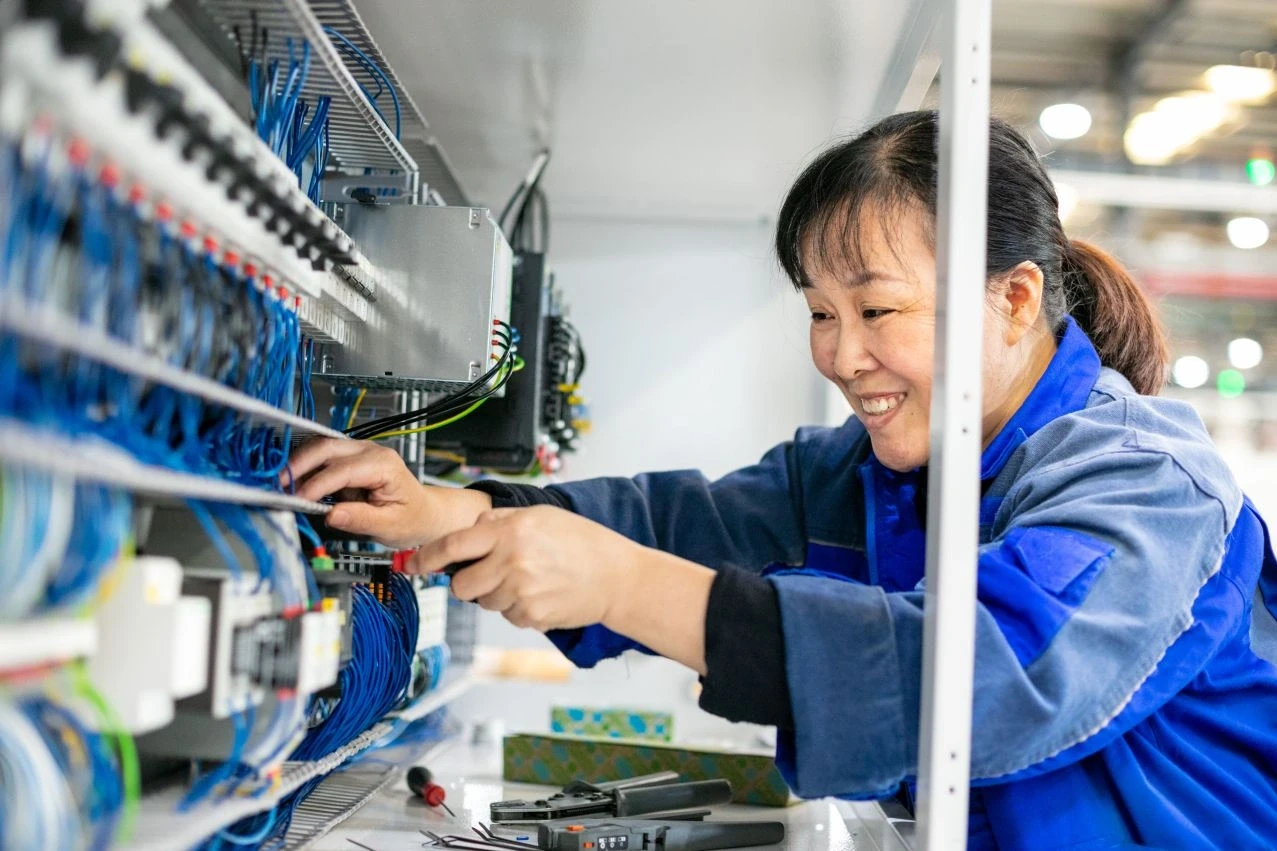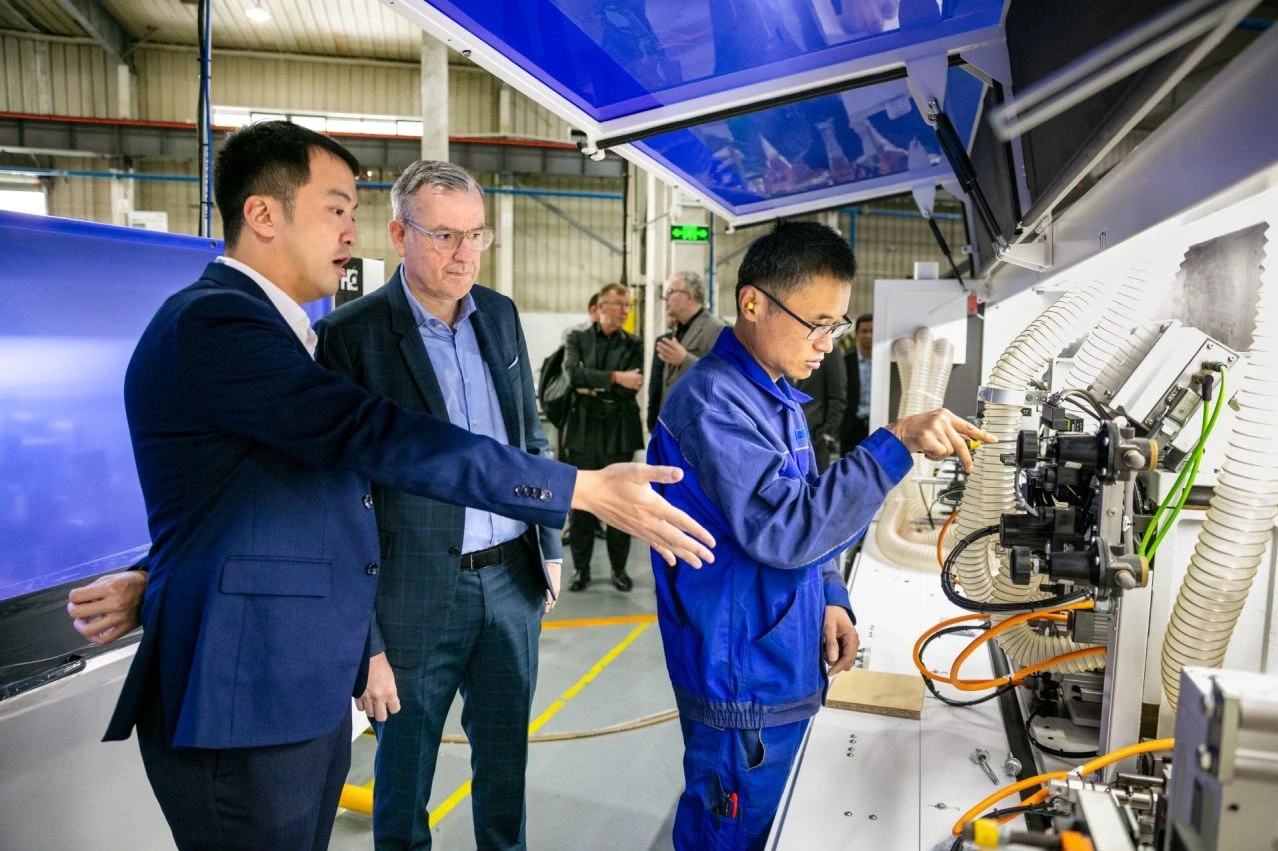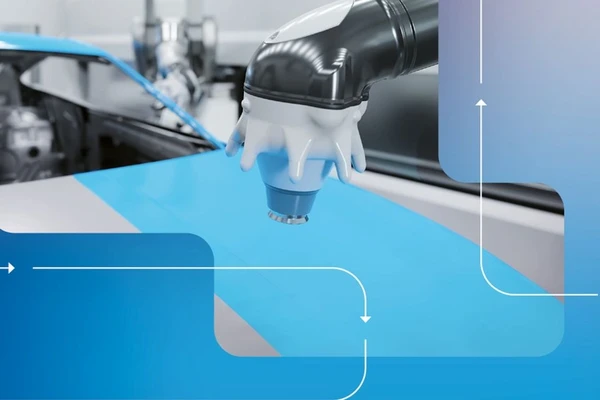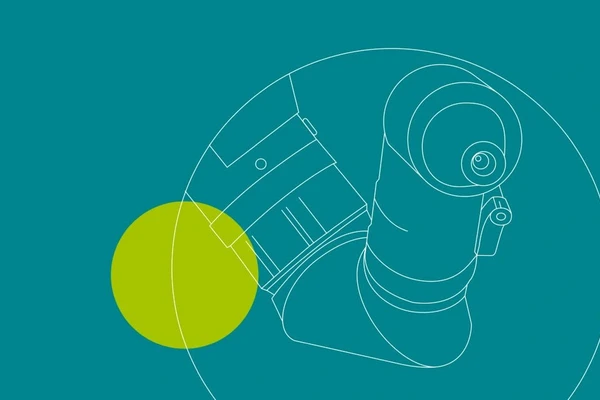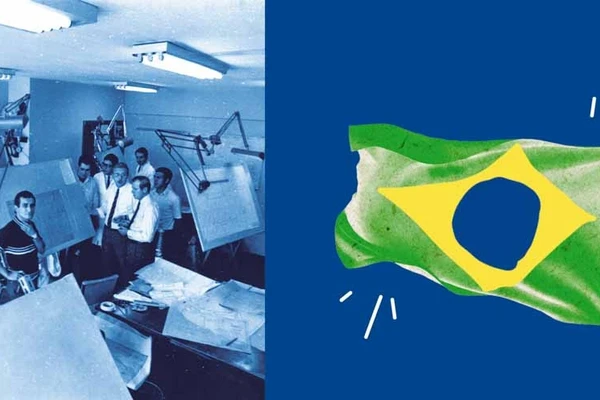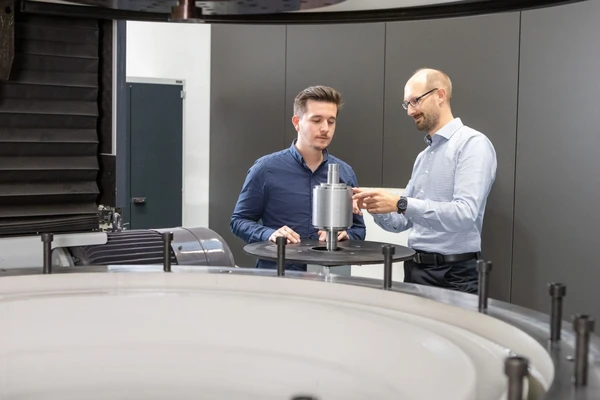
Traveling through Shanghai in a minibus
Apr 8, 2025
China is one of the most important markets for the Dürr Group. In November, CEO Dr. Jochen Weyrauch and the Group management team spent nearly two weeks traveling through the country to explore its rapid transformation and develop new business models. The group gained some exciting insights.
The border officials at Pudong Airport check Jochen Weyrauch's passport and smile at him. Then the CEO steps through the doors into the open air. In Shanghai, the sun pushes through the haze. A fresh November breeze blows; it is 16 degrees Celsius. Great weather for a city trip.
But the CEO has no time for sightseeing along the colonial promenade or shopping on the bustling Nanjing Road. His schedule is tightly packed from morning to evening for nearly two weeks. Together with nine members of the Group management team and the managing directors of the Chinese companies, he will visit the sites of Dürr, Schenck, HOMAG, and BBS Automation in the Shanghai area. He will meet with local employees and customers, as well as consultants and investment bankers. And he will do a lot of listening. “China is changing rapidly, and it is important to understand this transformation,” says Weyrauch.
The country is of strategic importance to the Dürr Group. The company came to the People's Republic back in 1983 to build a paint curing oven for Volkswagen. Today, China is Dürr's most important individual market after the United States. 16 percent of sales come from the People's Republic with its nearly one and a half billion inhabitants. All the Group's divisions operate large sites in China. From here, they supply industrial companies with paint systems, woodworking machinery, or balancing and automation technology. In recent years, the country has also developed into a base from which emerging countries in the global South are supplied.
Traveling through the urban jungle in a minibus
A sand-colored Toyota minibus collects Weyrauch and his group every day at 8am. The hotel is located 13 kilometers west of the city center — which is quite central for a large Chinese city. Traffic in Shanghai, which is home to 25 million people, is unpredictable. It can take ten minutes or an hour to travel five kilometers.
But even time spent in traffic can be used to type on a laptop, have a conversation, or simply observe. How has Shanghai changed? What stands out the most? “The city is becoming greener and greener,” says Weyrauch, who first visited over 30 years ago. Streets and concrete are no longer the only features defining this metropolis. The city administration has created parks and planted trees. The outer districts also look more appealing than before. It seems that efforts are being made to further improve the quality of life after the difficult Covid years.
Travel Journal Q&A
What most shaped your perception of China?
Jochen Weyrauch: The speed at which the country and its society are developing. The determination of the companies and people is truly impressive. It struck me how seamlessly daily life operates, such as the punctuality of public transport or the ease of rescheduling something via an app. People in China love technical gadgets, which are increasingly found in almost all products — from smartphones to cars.
What cars are those?
The large windows of the bus offer an excellent vantage point for observing the vehicles on the road. “A few years ago, you would mostly see Western and Japanese car brands here,” says Weyrauch. Today, Chinese manufacturers also shape the landscape. One example is the Avatr brand. It belongs to a joint venture between the Chinese car manufacturers Changan and Nio. The technology corporation Huawei and the battery manufacturer CATL are also on board. With over 500 horsepower, the top-of-the-range model is designed to cover up to 700 kilometers on electric power and with a high degree of autonomy. The interior features premium leather instead of plain plastic. And all of this for a price of 50,000 euros from new. Aboard the Dürr minibus there are many managers who know a thing or two about car production costs. A lively discussion immediately ensues.
At 8:30am, the bus stops at the HOMAG company yard in Shanghai. The tour of the sites will follow the same pattern over the next few days. It will start with a visit to the production facilities, followed by discussions with local management and employees on site.
The manufacturer of woodworking machinery is producing less than usual at the moment. The management discusses the reasons for this in the early evening with a consultant and investment banker who has lived in China for a long time. The Board of Management has invited him as an expert to hear his analysis of the transformation in China and of the current situation.
The Chinese economy continues to grow, albeit not at the same pace as before the pandemic. According to the expert, companies that have good ideas and produce quickly and cheaply still stand a strong chance of continuing to be successful. He believes that the state does not aim to push Western companies out of the market, but rather to encourage competition and innovation. This becomes evident at the other Group locations. Some of them produce so much that logistics space is becoming scarce.
But isn’t China said to subsidize its key industries, enabling it to offer many products at lower prices than foreign competitors? Weyrauch does not dismiss this, but he also acknowledges the other side. When talking to people on the ground, he repeatedly finds that they have a different perspective on the issue. “It appears that, in China, the EU's agricultural policy, for example, is viewed with skepticism, as it is thought to complicate access to the internal market.”
Travel Journal Q&A
What did you see as a challenge?
Jochen Weyrauch: I have been paying very close attention to how good Chinese companies’ products have become. During Covid, the country developed very rapidly in key sectors such as the automotive industry, almost unnoticed by the West. Many companies can now easily compete with global technology leaders, with these companies’ products often costing significantly less. Anyone aiming to succeed in the Chinese market in the future should closely monitor this development and consider what lessons can be learned.
Red wine from the People’s Republic
It also becomes clear during dinner at the restaurant just how much the country is changing. Dumplings, pieces of meat and fish, and spicy vegetables are served at a traditional round table with a rotating platter. This is served with red wine — not from Europe, South Africa, or Australia, but from China. “For me, as a wine lover from one of Germany’s top wine-producing regions, I found tasting these Chinese wines an exciting experience,” says Weyrauch. Vineyards with Cabernet Sauvignon, Merlot, or Pinot Noir are no longer a rarity in the People's Republic. On the contrary: When it comes to the size of the wine-growing area, China is now on a par with France. Wine consumption has also increased significantly over the past 20 years.
This transformation breeds confidence. According to Weyrauch, anyone who meets Chinese businesspeople quickly notices how self-confident they are. They are proud of what they and their country have achieved over the past decades.
Questions from the app
This becomes evident during a visit to Dürr Paintshop Systems in Shanghai. The agenda includes an employee meeting on-site. The employees gather in large numbers in the canteen, with even more following the meeting online. Using an interactive app, they type questions into their smartphones that appear on a large screen in the canteen.
One of them wants to know what effects the reorganization of Dürr’s paint shop business will have locally. Someone else asks whether it involves transfers. Or what impact a possible trade conflict after Donald Trump’s election might have on Dürr in China. The employees are eager to hear answers straight from the Board of Management.
Success is inspiring — especially in China
For people in China, it is very important to work for a successful company. Growth is considered attractive by employees, as it secures jobs. This can be observed during a visit to BBS Automation. The Chinese business of the Group’s young automation subsidiary is growing rapidly. “When we walked across the campus in the evening, most of the offices were still occupied,” says Weyrauch. Overtime is paid, of course. If someone leaves the office very late, they can call a taxi at the company's expense.
Timely train
In the late evening, the multi-lane roads in the region usually allow for smooth travel. During the day, the train is a better option. This also applies to the CEO, whose plan for the next day is to visit customers in the industrial metropolis of Hefei, 500 kilometers away. The high-speed train arrives on time, and not a second late. In first class, there are comfortable seats that can be turned to face the direction of travel. Internet is no issue — the WiFi on board works perfectly.
Digital technology is really important in China. The fancier, the better. On the train, there are people everywhere engaged with new apps on their smartphones. “I also like to download new apps at home and try them out,” says Weyrauch. He finds it interesting to see how tech-savvy the Chinese are and how creative the apps are.
Shaking your smartphone allows you to find random contacts nearby. If you scan your face in a fast-food restaurant, you will be offered a dish tailored to your gender, age, and mood. Vehicles greet their drivers with a friendly “Hello” as they enter, projecting the word as a hologram onto the windshield.
Travel Journal Q&A
What impressed you most about people in China?
Jochen Weyrauch: The confidence with which businesspeople in the country conduct themselves. In the past, I often had the impression that people looked up to their counterparts from established industrialized countries. Now, we speak as equals. People are proud of what they have achieved — and I think rightly so.
Thoughts above the clouds
So how do machines and systems from a German company need to be designed to sell in China? What do they need to feature, aside from technical gimmicks? These questions are on Weyrauch's mind during his customer visits — for example, during a business dinner with the electric car manufacturer Nio. How does its board of management view Europe? “They still appreciate technology from Germany, but they have the impression that we’re getting bogged down in red tape and therefore becoming too slow," says Weyrauch. The picture becomes clearer with every conversation. Cars, machines, and systems developed in China are getting better and better and are cost-effective. Foreign companies that want to succeed in China must be able to keep up. One requirement for this is to have a strong local presence in order to listen to customers, recognize trends, and remain competitive. The Dürr Group has focused on this approach for a long time.
Before the return flight at the gate in Pudong, the CEO sums up his trip to China: “Traditional engineering solutions that strive for perfection will not get us very far here in the long run.” European companies should strengthen research and development locally and give their Chinese subsidiaries more freedom to do so. After all, they understand better what matters in their home market. This also helps foster stronger relationships with customers in China.
As the plane takes off, Shanghai disappears into the autumn haze. Clouds envelop the aircraft. Weyrauch briefly closes his eyes — there is a lot to do in Germany.
More about
- Join CEO Dr. Jochen Weyrauch and a team from the production department on their road through building blocks, quiz cards and bamboo canes: → Values built to last
- On the road with CEO Dr. Jochen Weyrauch and Hannah Helmke, the founder of right°: → Climate, facts, and emotions

Martina
Bausch
Officer Online Magazine
Corporate Communications & Investor Relations
Dürr Aktiengesellschaft
Carl-Benz-Str. 34
74321 Bietigheim-Bissingen
Germany
Carl-Benz-Str. 34
74321 Bietigheim-Bissingen
Germany

